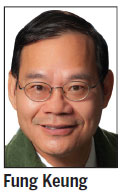HK must do more to help mentally ill people
Updated: 2014-06-10 07:18
By Fung Keung(HK Edition)
|
|||||||||
The Hospital Authority is prepared to improve mental health services and employ more staff as it faces a record number of patients with mental illness. A special external committee recommended in early June that more staff were needed. But sadly the increase in staff may not be enough.
The committee's report was released at a time when the issue of mental health in Hong Kong was under the spotlight. Several days before the report was released, a gunman named Li Tak-yan shot and killed a neighbor at a Kowloon Bay housing estate before turning the gun on himself. The tragedy came two years after a court-ordered psychiatric review found that Li was suffering from emotional problems. These problems easily develop into mood disorders, which are classified as mental illnesses.
A day after this incident a 36-year-old woman, thought to be suffering from post-natal depression, hacked her 18-month-old daughter to death. The woman, who was divorced and lived in a Sham Shui Po public housing estate, had not received any treatment for depression. But women suffering from post-natal depression should be treated as mental patients, and looked after accordingly.

Among the measures recommended by the Hospital Authority's external review committee is increasing the number of case managers involved in mental health issues. These are the medical professionals and social workers, who provide personalized, intensive support to many of the 39,000 Hong Kong residents with severe mental illnesses - the so-called high-risk group.
Of the 39,000 severely mentally ill people who are free to wander Hong Kong's streets, about 10,000 have violent tendencies. They can easily attack other people - with or without provocation. Local residents call these patients "time-bombs". The Hospital Authority's case managers (psychiatric professionals, clinical psychologists and social workers) are overloaded primarily with cases of people suffering from mental illness. So it is important that the government allocate adequate resources and employ more psychiatric professionals to care for this category of people.
The external committee's recommendations were set out in a paper submitted to the Legislative Council (LegCo) on June 6. Apart from suggesting an extension of intensive support to all patients in the first three years after diagnosis - a significant increase on the 65 percent presently receiving such support - the committee also recommended simplifying access to new psychiatric drugs. Current practice dictates that psychiatric patients must pay for newer, more expensive, and supposedly more effective drugs.
According to the committee's paper to LegCo lawmakers, the number of Hongkongers being treated for mental illness rose from 165,300 in 2009 to 205,000 by the end of 2013 - an alarming increase of 25 percent in only four years.
The special committee paper also suggests that the Hospital Authority expand its case management program - introduced in 2010 - in order to offer intensive support to the nearly 40,000 high-risk patients. This money would be well-spent if some of the "time-bomb" cases were to be defused. We have to do more to prevent mentally ill people becoming violent and attacking or even killing innocent people.
A local newspaper reported that the committee's paper recommends that the Hospital Authority increase the ratio of case managers (medical professionals and social workers) to patients from about one to 55 to one to 50.
The newspaper quoted a spokesman for the Patients' Rights Association in Hong Kong saying these recommendations were insufficient to enhance the overall quality of mental health services. The spokesman said it was more important that the government developed a comprehensive policy of providing integrated support for mentally ill patients. He reiterated that the external committee's recommendations did not go far enough. He said that in Australia, each case manager would deal with only 20 patients - compared with 50 in Hong Kong.
The crucial issue is: Given that Hong Kong has huge fiscal reserves, the government is willing to allocate more resources to help the mentally ill, thus reducing the likelihood of these people committing violent acts in society.
The author is coordinator of the B.S.Sc in financial journalism program at Hong Kong Baptist University.
(HK Edition 06/10/2014 page9)